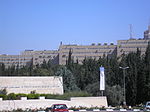Sheikh Badr Cemetery
1948 establishments in IsraelCemeteries established in the 1940sJewish cemeteries in Jerusalem

Sheikh Badr Cemetery (also Givat Ram cemetery) is an 8 dunams (0.80 ha; 2.0 acres) Jewish burial ground in west-central West Jerusalem. It was established as a temporary burial ground during the 1948 Arab siege of Jerusalem. Most of its military and civilian graves were transferred to Mount Herzl and Har HaMenuchot, respectively, in late 1950. The cemetery continued to accept burials up until the official opening of Har HaMenuchot in November 1951.
Excerpt from the Wikipedia article Sheikh Badr Cemetery (License: CC BY-SA 3.0, Authors, Images).Sheikh Badr Cemetery
Rothschild, Jerusalem Kiryat HaMemshalah
Geographical coordinates (GPS) Address Nearby Places Show on map
Geographical coordinates (GPS)
| Latitude | Longitude |
|---|---|
| N 31.78 ° | E 35.2057 ° |
Address
רוטשילד
Rothschild
9432531 Jerusalem, Kiryat HaMemshalah
Jerusalem District, Israel
Open on Google Maps










